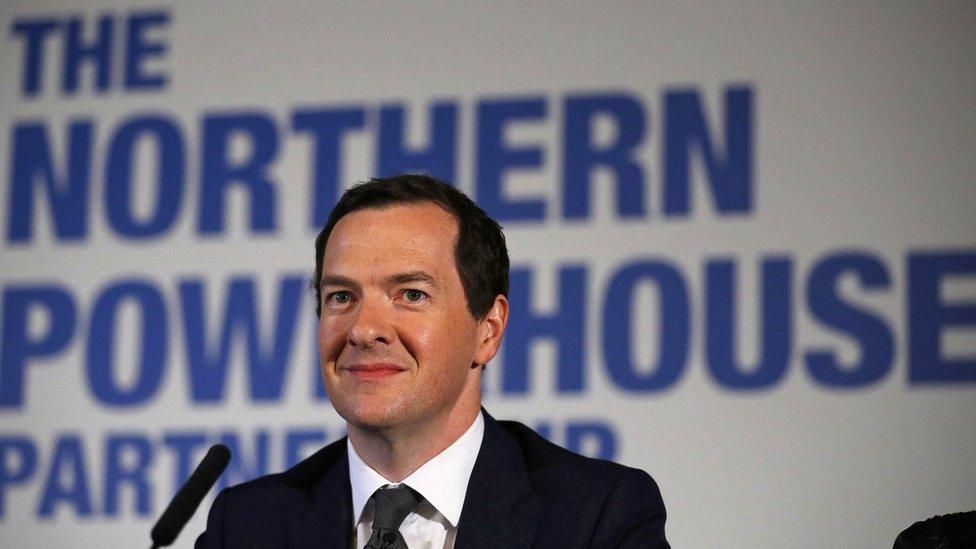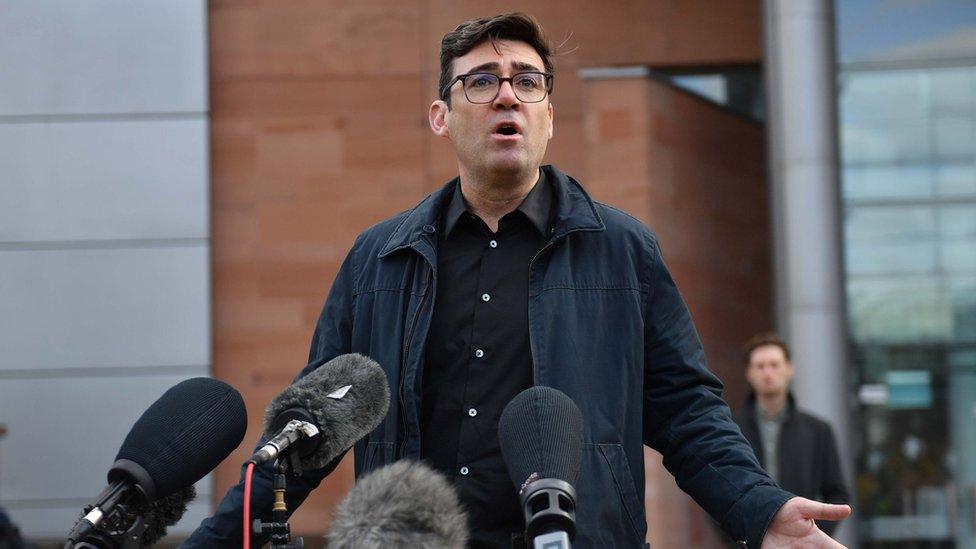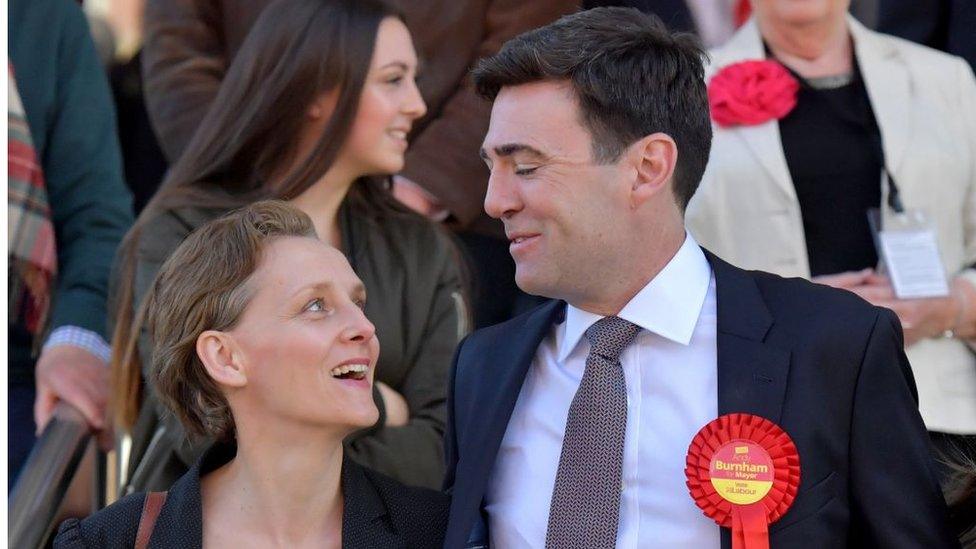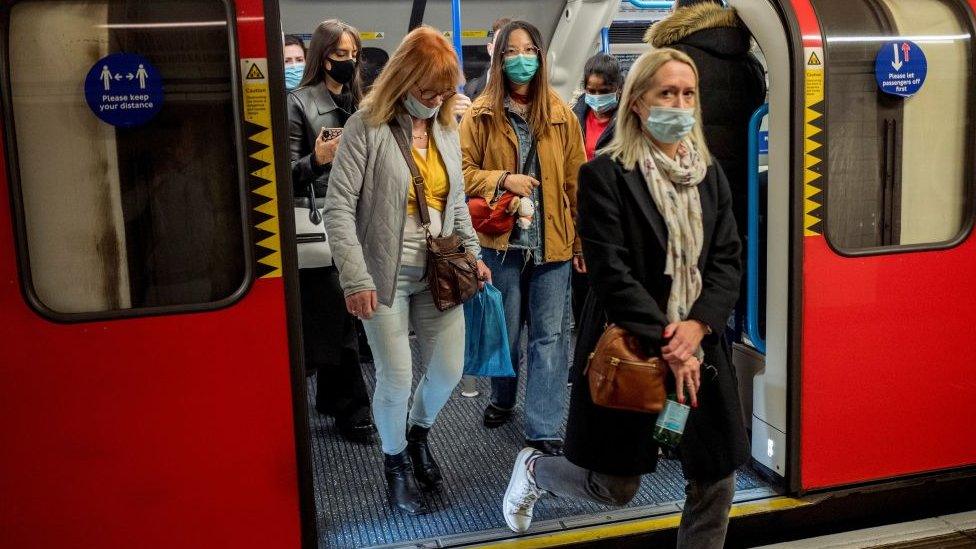Andy Burnham's profile shows success of new mayors, says George Osborne
- Published

George Osborne at a meeting of the Northern Powerhouse Partnership in 2016
Greater Manchester mayor Andy Burnham's impact on the coronavirus debate demonstrates the success of the new Northern mayors, says George Osborne.
The former chancellor introduced metro mayors in devolution plans for English regions while in government.
He told a conference of northern business leaders mayors were now part of the "national conversation".
But Mr Burnham has said England has "devolution in name but not in reality".
The Labour former cabinet minister has been at war with Prime Minister Boris Johnson over financial support for his region, which culminated in the PM imposing tier three coronavirus restrictions.
Later, in an interview with the BBC's Newscast, Mr Osborne warned Mr Johnson against being "at war" with the Treasury, following the latest round of financial support being announced.
He told the prime minister to "embrace" his position as "First Lord of the Treasury" - the additional role held by the PM - adding: "You know the prime minister who makes use of the Treasury, where you really do have a lot of policy-making capacity, is a prime minister who is going to be more powerful."
Mr Osborne, who among other roles now leads the Northern Powerhouse Partnership, called for more devolution during the Covid recovery.
Speaking to the Great Northern Conference, he said he could see "real representation in the North".
"We now have a national political conversation where representatives of the north of England are heard on our national news.
"And that is a fantastic success story," he added, referring to coverage of Mr Burnham's clash with the government over financial support for Manchester.
"We need to be more courageous in giving many more powers to these local elected leaders," Mr Osborne said, as "we're beginning to see a much more balanced, healthy British society and state where not every decision is taken at Westminster and other voices are heard."
"But we've got much more to do."
But speaking at a parliamentary select committee meeting on Thursday, Mr Burnham said England had "devolution in name but not in reality".

Mr Burnham addresses the media in Manchester after the breakdown of negotiations with the government
Mr Burnham rejected accusations he had been "posturing" during the failed negotiations with the government.
He accused ministers of operating a "divide and rule" strategy, which he said was "not the way to get a through a pandemic" which has had a "severe" impact on his region.
Mr Burnham was supported at the Commons business committee by Steve Rotheram, the mayor of the Liverpool City Region, who said that "for far too long too many decisions have been taken with London centricity - not just the area of London, but the overall London culture that exists in Parliament".
Mr Rotheram was the first regional mayor to make an agreement with the government for his area to adopt tier three restrictions.
Since 2017, eight English regions have appointed directly elected mayors. This means 12m people in England, over 20% of the population, now live in mayoral authority areas. Mayors have some powers over policy areas such as adult education and transport, but these vary from region to region.
The eight new regional mayors operate under a different system to London, which elected its first mayor in 2000.
The Conservative Party's 2019 election manifesto committed to "full devolution across England... so that every part of our country has the power to shape its own destiny," which is set include more metro mayors.
The government was due to publish a white paper on the subject in 2020, but the Financial Times reported it had been delayed until next year.
In a speech via video link to the Great Northern Conference, Mr Johnson reiterated the government's commitment to "level up" the North of England.
"Even now, as we are still up to our thighs in the mud of the trenches, grappling with this virus, my message to you is that it cannot be enough simply to get through the crisis. We must build back better, build back stronger, build back faster," he said.
He added: "That means our work to level up and unleash the talent and potential of the North - by investing in education, skills and infrastructure - is now more urgent than ever.
"We will move departments of state, ministers, private offices and all, to great Northern cities and regions that represent the future of this country."
- Published20 October 2020
- Published20 October 2020

- Published22 October 2020

- Published21 October 2020
